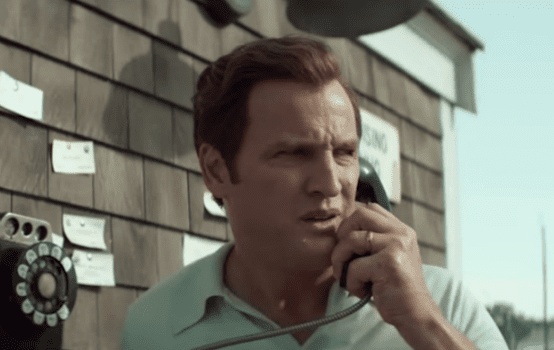Chappaquiddick: No Mercy for Ted Kennedy

Over the last year or so, we’ve seen a flurry of compressed-timeline films—Dunkirk, Darkest Hour, The Post, and so on—that center on the circumstances immediately surrounding a momentous historical event. One might even call these anti-epics: their narrative scope is tightly restricted, their casts are slim, and their screenwriting is taut and spare.
Chappaquiddick, in the capable hands of director John Curran, is among the strongest entries in this genre. This is due to its careful choice of subject matter: there’s enough here to generate a satisfying movie, but not so much that the film feels frustratingly stripped of context. One isn’t left wondering why it was made at all (The Post), or, conversely, craving wide-angle establishing shots of events taking place elsewhere (Darkest Hour).
Chappaquiddick delves into a political scandal unfamiliar to most Millennials—the 1969 car accident involving Senator Edward “Ted” Kennedy (here played by Jason Clarke) and political aide Mary Jo Kopechne (Kate Mara). On the night of July 18, following a party on Chappaquiddick Island in Massachusetts, Kennedy negligently veered off a bridge and plunged into the water below. While the senator managed to escape the submerged vehicle, Kopechne drowned. Even more damningly, Kennedy declined to report the accident to authorities until late the next morning. (A police diver later testified that if the crash had been promptly reported, Kopechne would likely have survived.)
The days following the accident play out like a second crash, this time in slow motion. We see everything: early attempts at political damage control, spurious claims of “shock” and “trauma” suffered by Kennedy, efforts to bury unflattering coverage amidst reports of the Apollo 11 moon landing, and so on. (In perhaps the film’s tawdriest moment, Kennedy fights with a companion about whether to wear a fake neck brace to Kopechne’s funeral.) Throughout it all, a sense of lurking menace is positively palpable.
In Curran’s telling, Kennedy himself is the chief architect of that menace: Chappaquiddick is no puff piece but a decidedly anti-hagiographic portrayal of its protagonist. Clarke, fully channeling Curran’s bleak vision, infuses his character with a horrifying, House of Cards-lite remorselessness. After escaping from the wreck of his car, a sodden Kennedy staggers back to the Chappaquiddick party house where he’s immediately accosted by a close ally. “I’m never going to be president,” the senator slurs, with nary a word about Kopechne’s fate. Shortly thereafter we see Kennedy lying supine on the fateful bridge, staring idly up at the dark skies overhead, while his two friends repeatedly dive down to the sunken vehicle in an attempt to rescue Kopechne. If this wasn’t enough, Curran juxtaposes shots of Kopechne’s pale body being pulled to the surface with Kennedy sitting down to brunch the next morning.
On-the-nose? Sure. Brutally effective? Absolutely.
Yet remarkably, despite Chappaquiddick’s willingness to subject its central figure to unflinching critique, Kennedy himself never becomes a caricature. Rather, in the context of his tortured relationship with his father Joe Kennedy, Sr. (Bruce Dern), the younger Kennedy comes off as positively sympathetic. Even in the final months of his life, the elder statesman is a positively Machiavellian player, hell-bent on preserving the dynastic power of the Kennedy name. His advice to his son, for instance, distills down to a solitary word: “alibi.” And while this certainly doesn’t exculpate Kennedy, it does explain a good deal: one needn’t speculate much further about the source of the younger Kennedy’s deficient moral sensibilities.
The film closes with the taunting reminder that Kennedy went on to a long career in public service, and was even dubbed “the lion of the Senate.” Perhaps a posthumous reckoning is better than none at all, but such a finale offers cold comfort to the viewer longing for some form of earthly justice. One can only speculate how the Chappaquiddick incident might have played out in the era of #MeToo. Alas, we can never know.
Beyond its haunting themes, Chappaquiddick holds up on the technical fronts. While Clarke certainly takes center stage, the rest of the cast does fine work. Mara is good—if underutilized—and Ed Helms and Jim Gaffigan turn in solid supporting performances. Maryse Alberti’s cinematography evokes a grim, David Fincher-esque ambiance, and Garth Stevenson’s eerie, slinky score effectively contributes to this dark mood.
But in the end, nothing lingers so powerfully as Kennedy’s eventual televised plea to the American people to allow him to “put this behind [him],” intercut with footage of Massachusetts residents rallying behind the apparently chastened senator. It’s a flashback to a bygone, pre-Watergate age, one characterized by the naïve belief that the apologies of public figures actually meant something. There’s a certain romance associated with that vision of politics, one of a world without mass cynicism and the demolition of public trust: Chappaquiddick forces its audience to confront the ugliness beneath. Ours is a time of civic disenchantment, for reasons that sadly make perfect sense.
Watching Chappaquiddick is the cinematic equivalent of swallowing a hot ember—and I mean that in the best of ways. This movie unspools painfully, mesmerizingly, like a slow burning sensation working its way through your gut. And yet it’s impossible to look away.
[youtube https://www.youtube.com/watch?v=qG-c8DtOm9g&w=560&h=315]
John Ehrett is executive editor of Conciliar Post and a graduate of Yale Law School.